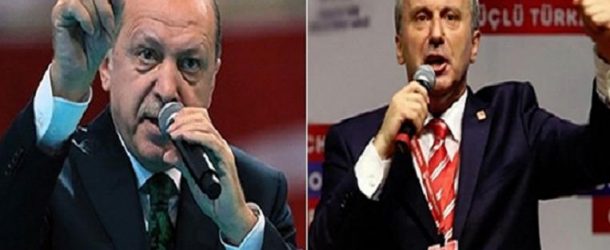Turkey will have its joint parliamentary and Presidential (first round) elections on June 24, 2018. The second round of Presidential election will take place -if necessary- on July 8, 2018. Candidates of major political parties are determined and announced last week as the day of the elections approaches. In this piece, I am going to analyze Turkey’s 2018 Presidential election.
Turkey’s ruling Islamist-conservative AK Parti (Justice and Development Party) will support its uncontested leader Mr. Recep Tayyip Erdoğan (64) in the Presidential election. Other than AK Parti, two far-right political parties; Nationalist Action Party (MHP) and Great Unity Party (BBP) will also support Mr. Erdoğan as their Presidential candidate. Although Turkey has serious foreign policy troubles and economic problems in the recent years, Mr. Erdoğan still seems very strong and his party enjoys 44-45 % electoral support according to last surveys. Considering the fact that MHP also had 12-13 % votes before splitting up with the Good Party (İyi Parti) (now it could be around just 7-8 % of the total votes) and BBP -thanks to the memory of its charismatic far-right leader Muhsin Yazıcıoğlu- has a stable 0.5-0.6 % electoral base, Mr. Erdoğan is obviously the strongest candidate for the post of Presidency. Mr. Erdoğan is a man of the streets who has established a strong bond with Islamist groups in Turkey due to his anti-secular and anti-establishment policy style as well as his hardworking personality. He has won all the elections and referendums taking place in Turkey since 2002 and never experienced a defeat. However, as Turkey’s economy is shaken by the increasing inflation and higher foreign exchange rates in recent months, in addition to Turkey’s problematic relations with the U.S. and Europe Union in recent years, Mr. Erdoğan now seems more vulnerable to criticism. In addition, Mr. Erdoğan and his party’s Kurdish support will certainly decline in these elections due to his rapprochement with far-right Turkish nationalist groups. Turkey’s decreasing democratic quality is also a serious concern for liberal groups who would not support Mr. Erdoğan anymore. Another problem for Mr. Erdoğan and his party is Turkey’s failed Syria policy which led to terrible economic and political consequences as well as increasing security risks. More importantly, Mr. Erdoğan now has a frustrating contender: Mr. Muharrem İnce. Mr. Erdoğan’s biggest advantages on the other hand are; his democratic stance and victimized image after the failed coup attempt of 15 July 2016 organized by an anti-Erdoğan Islamist cult FETÖ (Fethullah Gülen followers), his 16 years of experience in ruling a torn country like Turkey and his identification with Islam which guarantees him 30-35 % support.
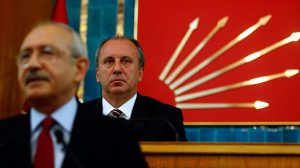
Mr. Kemal Kılıçdaroğlu and Mr. Muharrem İnce
A teacher of Physics as profession, Mr. Erdoğan’s main rival Mr. Muharrem İnce (54) is a Republican People’s Party (CHP) militant coming from CHP youth branch. Mr. İnce is known as an excellent speaker using populist arguments equally effective as Mr. Erdoğan, but from the reverse angle, in a pro-secular way. He has been in Turkish Parliament since 2002 as CHP’s Yalova deputy. He became a leadership candidate twice against Mr. Kemal Kılıçdaroğlu (70) and lost both of the intra-party elections. However, his secular-nationalist speeches reminding the old Kemalist style politics in Turkey became most popular political videos in the last few years in the social media applications such as Facebook and Twitter. Especially young people like his aggressive and controverter style. Anti-Erdoğan camp in Turkey now looks forward for Mr. İnce’s attacks on Erdoğan and his party with great enthusiasm. Mr. İnce defends classical Kemalist theses and a return to parliamentary system. İnce could easily get the votes of secular nationalist people in MHP and Good Party in the second round, but his rhetoric will not appeal to pro-Islamist and pro-Kurdish voters. That is why; Mr. İnce’s candidacy will certainly make the election hotter, but will not guarantee a victory for CHP. Moreover, since Mr. İnce will lose his seat in the parliament due to his Presidential candidacy, some people claim that Mr. Kılıçdaroğlu deliberately chose him since İnce was his strongest critic and adversary for party leadership. Mr. İnce’s polemic-based style will certainly disturb and harm Mr. Erdoğan’s image as “Mr. Invincible”, but his chance of winning the election seems still low. I think Mr. İnce will take the second seat after Mr. Erdoğan in the first round of elections and he will be Erdoğan’s contender if the second round takes place. However, Mr. Erdoğan can still take more than 50 % of the votes in the first round as in the case of 2014 Presidential election. Mr. İnce can make a meaningful rise in his party’s votes if second round takes place, but I think he does not have too much chance against Mr. Erdoğan who is still seen as a hero by large Islamist-conservative groups in Turkey. Mr. Kılıçdaroğlu on the other hand is winning anyway; he might get rid of his strongest rival within the party and he can also take a record vote in the parliamentary election thanks to his electoral coalition with Good Party, center-right Democratic Party (DP) and Islamist Felicity Party (SP). As far as I am concerned, Mr. Kılıçdaroğlu wants to balance Mr. Erdoğan’s power by having a majority within the parliament with this clever move.
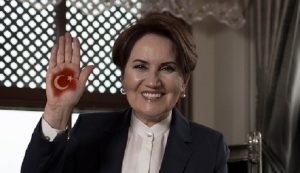
Mrs. Meral Akşener
Another strong candidate is Good Party (İyi Parti) leader Mrs. Meral Akşener (62). Good Party is established by top former MHP officials who had problems with the party’s old leader Mr. Devlet Bahçeli (70). Mrs. Akşener is a very influential candidate who could steal votes from MHP, CHP and AK Parti, but after the announcement of Muharrem İnce as CHP’s Presidential candidate, probably she will take the third seat in the first round of Presidential election. Mrs. Akşener is a secular nationalist who also tries to appeal to conservative groups; but it seems like she will not be able to get too much votes from AK Parti due to Mr. Erdoğan’s strong leadership and unending charisma. In addition, Mrs. Akşener’s party engaged in an electoral pact with CHP, SP and DP and it seems like she will have to lead her party outside of the parliament after the elections. Mrs. Akşener also defends a return to parliamentary system which does not seem very realistic for the moment. She could get 10-15 % of the total votes, but since it will be her first election, her potential is still a mystery.
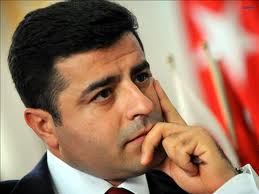
Mr. Selahattin Demirtaş
Other important Presidential candidates are; pro-Kurdish HDP’s former leader Mr. Selahattin Demirtaş (45), Fatherland Party (Vatan Partisi) leader Mr. Doğu Perinçek (76) and Islamist Felicity Party (SP) leader Mr. Temel Karamollaoğlu (78). Among these, Mr. Demirtaş can be really influential. Demirtaş became a candidate from prison since he is on trial, but not found guilty yet. He is the youngest Presidential candidate having good projects, new ideas and a good image especially for Kurdish voters. He could get 10-13 % of the votes due to his large Kurdish electoral support. Mr. Doğu Perinçek can also become an independent candidate with 100.000 signatures. His old style anti-Western socialist nationalist Fatherland Party (before its name was Workers Party-İP) is a permanent political actor in Turkey that was not able to reach even 1 % of the votes until now. I guess he could get 0.20-0.30 % of the votes if he could collect 100.000 signatures. Felicity Party leader Mr. Temel Karamollaoğlu can also become an independent candidate with 100.000 signatures since his party is not represented in the parliament and does not have a group of 20 deputies. I think he could get 2-3 % of the total votes. However, his Islamist political party Felicity Party (SP) could take much more votes as a reaction to corrupt practices of AK Parti in recent years. Although both parties come from Islamist National Outlook (Necmettin Erbakan) tradition, Erdoğan and his party now seems more secular and corrupt in the eyes of classical Islamists. So, Karamollaoğlu and his party could get protest votes from AK Parti electors. This might help opposition bloc (CHP-İyi Parti-SP-DP) to control almost half of the parliament and make things more difficult for Mr. Erdoğan.
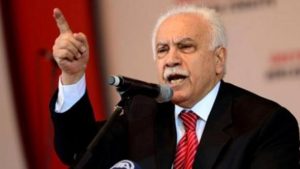
Mr. Doğu Perinçek
Looking at the picture now, it seems like the first round of the Presidential election might lead to such results:
- Recep Tayyip Erdoğan (48-52 %)
- Muharrem İnce (22-27 %)
- Meral Akşener (10-15 %)
- Selahattin Demirtaş (10-13 %)
- Temel Karamollaoğlu (2-3 %)
- Doğu Perinçek (0.20-0.30 %)
If the second round takes place, I think Mr. Erdoğan and Mr. İnce will compete and Mr. Erdoğan will win by 60 % to 40 %. But these numbers are just taken from Turkey’s opinion polling companies as well as my own observations and are not based on scientific studies.
Cover Photo: Mr. Recep Tayyip Erdoğan vs. Mr. Muharrem İnce.
Dr. Ozan ÖRMECİ


